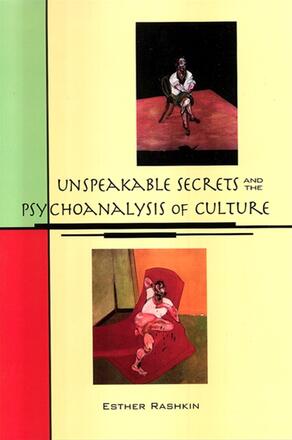
Unspeakable Secrets and the Psychoanalysis of Culture
Alternative formats available from:
Explores the radical political potential of close reading to make the case for a new and invigorated psychoanalytic cultural studies.
Description
Winner of the 2009 Gradiva Award, Theoretical Category, presented by the National Association for the Advancement of Psychoanalysis
Esther Rashkin argues that psychoanalysis galvanizes, as no other discipline can, an understanding of texts in their social, historical, and political contexts. Demonstrating that close reading can be a radical political practice, she exposes heretofore unseen ideologies concealed in works of film and literature, from Last Tango in Paris to The Picture of Dorian Gray, from Barthes's Mythologies and Balzac's Sarrasine to Babette's Feast. Psychoanalytic concepts such as identification with the aggressor, the crypt, cryptonymy, illness of mourning, and the phantom allow Rashkin to reveal how shameful and unspeakable secrets propel the narratives she examines. In the process, she convincingly makes the case for a new practice of psychoanalytic cultural studies, a practice that fully engages with the politicized discourses—anti-Semitism, racism, colonialism, censorship—that mark a text's location in history.
Esther Rashkin is Professor of French and Comparative Literary and Cultural Studies at the University of Utah and a psychoanalytic psychotherapist in private practice. She is the author of Family Secrets and the Psychoanalysis of Narrative.
Reviews
"…[a] bold and entertaining study … Rashkin makes a striking and memorable argument for utilizing the tools of psychoanalytic methodology, that have become unfashionable in some cultural studies circles, to reveal the unspoken horrors of atrocity, veiled anti-Semitism, and the guilty secrets of national history that lay beneath the surface of a range of cultural products. " — Nineteenth-Century French Studies
"This is fascinating work. Esther Rashkin makes an impassioned case for an end to the marginalization of psychoanalysis within cultural studies … Thought-provoking in both its content and its practice, this is truly a pleasure to read. " — French Studies
"One of the preeminent theorists of our time, Esther Rashkin has produced an outstanding work that will recast the still vibrant yet often stealth culture of psychoanalysis. Her readings and intuitions, motivated by a distinguished critical and clinical praxis, make irrevocable claims on post-Freudian theories of the crypt, maladie du deuil, incorporation and effects of the phantom, crucially repositioning the agon between close reading and ideological critique. The range and depth of her inquiry present brilliant dossiers on the history of unconscious transmission systems. " — Avital Ronell, New York University, and Jacques Derrida Professor of Media and Philosophy, the European Graduate School
"The psychoanalysis of culture is a formidable undertaking. Many try. Few succeed. Esther Rashkin, in this impressive new contribution, distinguishes herself as one who belongs in that elite group who can apply psychoanalytic thinking to cultural phenomena in a seamless and highly readable manner. Her use of leading Hungarian psychoanalytic thinkers is an auspicious choice that provides her discourse with a fresh perspective. I highly recommend this book to both students and scholars of interdisciplinary psychoanalysis. " — Glen O. Gabbard, MD, Brown Foundation Chair of Psychoanalysis and Professor of Psychiatry, Baylor College of Medicine
"This is the most exciting work of psychoanalysis I've read in the last decade, and a stunningly brilliant argument about the relevance of psychoanalytic interpretation for cultural analysis. It's a groundbreaking piece of intellectual work that will have a deep impact on the future of literary and cultural analysis. " — Georges Van Den Abbeele, Dean of Humanities, University of California at Santa Cruz
"This book is truly original, absolutely compelling, and brilliantly illuminating. One of the most important intellectual contributions it makes is its success in offering radically new and persuasive readings of texts we thought we had finished with and about which we thought there could be little left to say. Rashkin explodes that basically complacent assumption and makes familiar texts suddenly and breathtakingly new. The book is underpinned by a deep, implicit compassion for the ways in which human beings have attempted to come to terms with suffering, ways that are recorded by the fictions analyzed here. " — Karen Edwards, University of Exeter